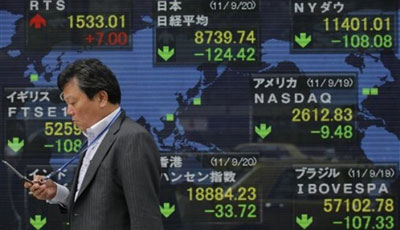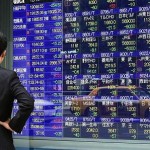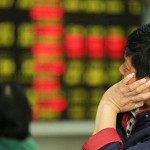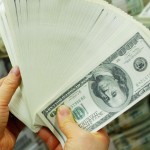Asia markets higher; Nikkei turns up on slightly weaker yen

Asia markets turned higher on Wednesday, shrugging off a global sell-off in equities overnight, as oil prices advanced and activity in China’s services sector showed signs of pick-up.
Australia’s ASX 200 was up 0.54 percent. Japan’s Nikkei 225 wavered before trading up 0.28 percent on the back of a slightly weaker yen relative to Tuesday’s session. Across the Korean Strait, the Kospi was up 0.33 percent, while Hong Kong’s Hang Seng index was up 0.12 percent.
Chinese mainland markets were mixed, with the Shanghai compositeflat and the Shenzhen composite up 0.36 percent.
Ray Attrill, global co-head of foreign-exchange strategy at National Australia Bank, said in a morning note there was no obvious catalyst for the sell-off overnight.
“Rather, we’d gauge that stock investors are retreating back into their shells ahead of the U.S. first quarter earnings seasons that kicks off in earnest next Monday,” he said.
Data released earlier showed China’s service sector strengthened in March; the Caixin services purchasing managers’ index (PMI) for March rose to 52.2, up from February’s reading of 51.2. A reading above 50 indicates expansion.
Oil prices advanced during Asian hours, with U.S. crude futures adding 2.76 percent to $36.88 a barrel, while global benchmark Brent futures were higher by 1.69 percent at $38.51.
Energy plays saw a rebound around the region, with shares of Santos adding 4.51 percent, Wood side Petroleum higher by 2.8 percent and Inpex adding 0.5 percent. Mainland Chinese oil shares were mostly up, with Sinopec adding 7.75 percent.
In the currency market, the dollar index, which measures the dollar against a basket of currencies, was flat at 94.66 as of 11:03 a.m. HK/SIN time.
The dollar/yen pair was trading at 110.50 in the morning local time, slightly stronger from Tuesday, when the pair fell as low as 109.94. That compares with levels above 112 last week.
Major Japanese exporters were mixed, with some taking cues from the slight rebound in the dollar/yen. Shares of Toyota were up 0.53 percent,Nissan added 1.18 percent and Honda was up 0.74 percent. Shares ofSony were down 0.16 percent and heavily weighted Fast Retailing lost 0.25 percent.
A strong yen is usually a negative for exporters as it affects their overseas revenue when converted into local currency.
Kathy Lien, managing director of FX strategy at BK Asset Management, said in a morning note that the stronger the yen gets against the dollar, the greater the problems will be for Japanese companies. “Most Japanese corporations are hedged at 115 so they are bleeding profits at 110 and lower,” she said. She expects more “jawboning” from Japanese policymakers in the coming days, with “the possibility of physical intervention if the dollar/yen falls much further.”
“It is clear that traders are trying to test the Bank of Japan’s limits because U.S. and Japanese data still support gains in the dollar/yen. The U.S. economy is improving (albeit at a slower than anticipated pace) while Japan’s economy is weakening,” she said.
The Australian dollar was up 0.21 percent against the U.S. dollar at $0.7559 in the afternoon local time.
The currency hit a Tuesday session low of $0.7508 before finishing at $0.7543, which, Stephen Innes, a senior FX trader at OANDA, said in a note, was due to a combination of “lower commodity price and risk-off sentiment.”
The Chinese yuan was nearly flat against the dollar at 6.4755; before market open, the People’s Bank of China set the yuan midpoint fix at 6.4754. China’s central bank lets the yuan spot rate rise or fall a maximum of 2 percent against the dollar, relative to the official fixing rate.
Major indexes in the U.S. closed lower, with the Dow Jones industrial average down 0.75 percent, the S&P 500 lower by 1.01 percent and theNasdaq composite off 0.98 percent. The FTSE closed down 1.19 percent.
Source: CNBC





























